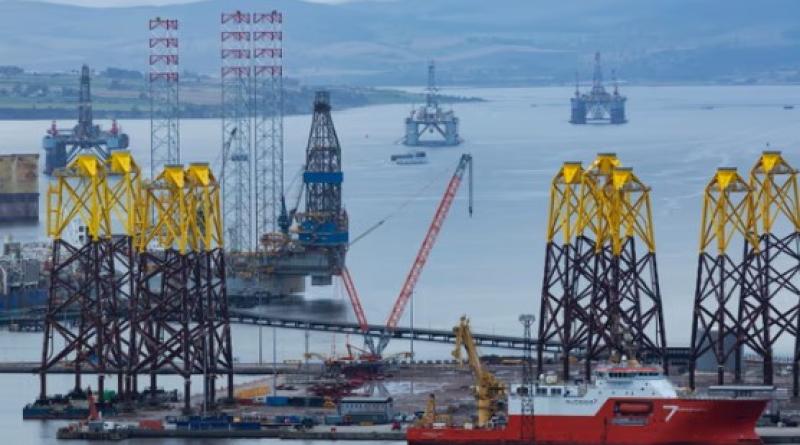Starmer says £2.5bn renewables jobs fund will help North Sea oil workers

Labour leader aims to set up ‘British jobs bonus fund’ to challenge oil firms to accelerate shift to clean energy
Keir Starmer has challenged the oil industry to dramatically speed up its shift to clean energy by offering up to £2.5bn to subsidise new jobs in renewables for North Sea workers.
The Labour leader has told executives from firms including Shell and BP that the UK is in a global race to move away from oil and gas, with competitor countries such as the US investing billions in climate-friendly technologies.
Starmer and Ed Miliband, the shadow climate secretary, hosted a roundtable with executives from 20 energy firms in Aberdeen on Thursday during a two-day visit to promote the party’s plans to decarbonise UK energy supplies by 2030 – a target date the oil industry is vigorously resisting.
Starmer will announce on Friday that if Labour wins the next election, it would set up a £2.5bn “British jobs bonus” fund to prioritise investment in three clean energy technologies, in regions heavily dependent on North Sea oil, including around Aberdeen and north-east England.
The technologies would be: carbon capture to support industries that still need oil and gas to pipe their waste CO2 into depleted North Sea oilfields; building floating windfarms for deep-water sites; and in green hydrogen – a zero carbon fuel needed for energy-intensive industries such as steelmaking, railways and chemicals production.
Starmer argues that Rishi Sunak’s recent decision to “max out” the North Sea’s oil and gas production and deprioritise green energy and technology investment is a strategic failure driven by the belief it will increase the Conservatives’ short-term electoral support, particularly in north-east Scotland.
“This Conservative party has zero ambition, zero plan and zero concern for the millions of British families suffering sky-high energy bills as a result of the government’s abject failure,” the Labour leader said.
“Every day that they play political games, causing uncertainty and investment risk for the sector, they are costing jobs and hitting people’s pockets. My Labour government will rise above short-termist gimmicks, put the country before our party, and deliver the long-term future of our energy industry.”
The oil industry lobbying group Offshore Energy UK (OEUK) says it is committed to a long-term transition to net zero but has embraced Sunak’s decision to license extraction in the Rosebank oil and gas field, the North Sea’s largest untapped field.
OEUK is pressing the government to support another £100bn in new North Sea investments, to replace the 180 fields it predicts will stop producing oil in the next decade. Climate scientists are adamant that doing so will sabotage global efforts to prevent runaway climate heating.
Starmer is understood to have argued in the roundtable that while oil and gas will still play a role in UK energy supply, a partnership was required between industry, unions and government to shift quickly on to zero-carbon technologies.
Labour has promised the £2.5bn jobs subsidy and other funding streams would support “historic energy communities” across the UK, including Grangemouth, a sprawling oil and petrochemical complex on the Firth of Forth. It also plans to invest in upgrading major ports around the UK, arguing that is a far wiser strategic investment than the freeports Sunak has vowed to create.
Starmer’s engagement with oil executives carries political risks but also recognises the significance of persuading the industry to accept the case for rapidly meeting the UK’s net zero targets, both for the general election and meeting Labour’s manifesto commitments.
Sunak has made clear he plans to frame Labour’s approach as a “war on motorists” and will accuse Starmer of destroying valuable North Sea jobs. Labour hopes voters, union leaders and oil workers will accept the urgency of the climate argument, and that Starmer’s strategy will also help it outflank the Scottish National party at the next election.
Floating offshore windfarms will provide much cheaper clean electricity but there are substantial reservations about how significant a role carbon capture and mass-produced hydrogen can play in the clean energy transition.
Photograph: Murdo MacLeod/The Guardian - Offshore wind turbine towers in the Cromarty Firth, Scotland. The Highlands port is also known as an ‘oil rig graveyard’.






